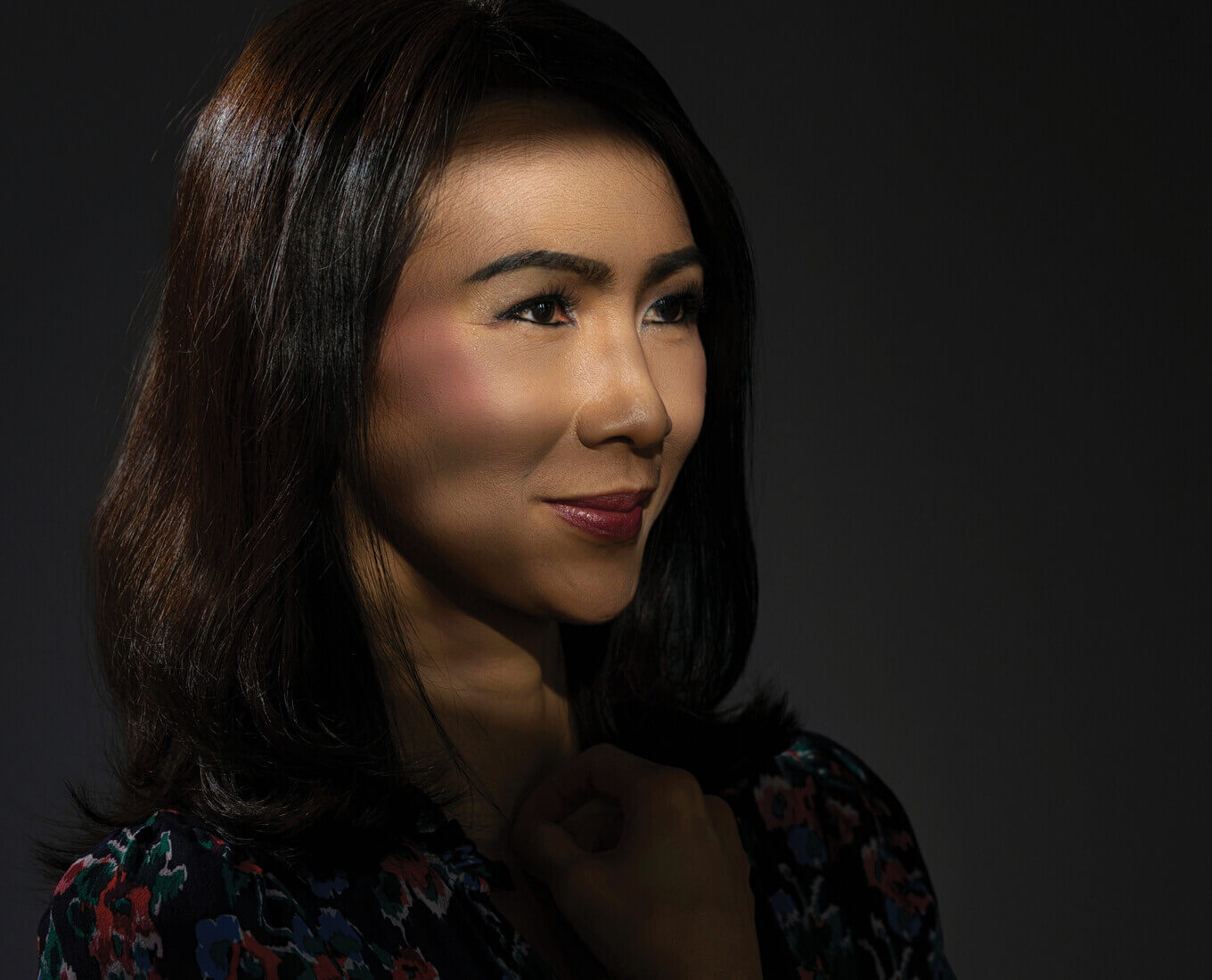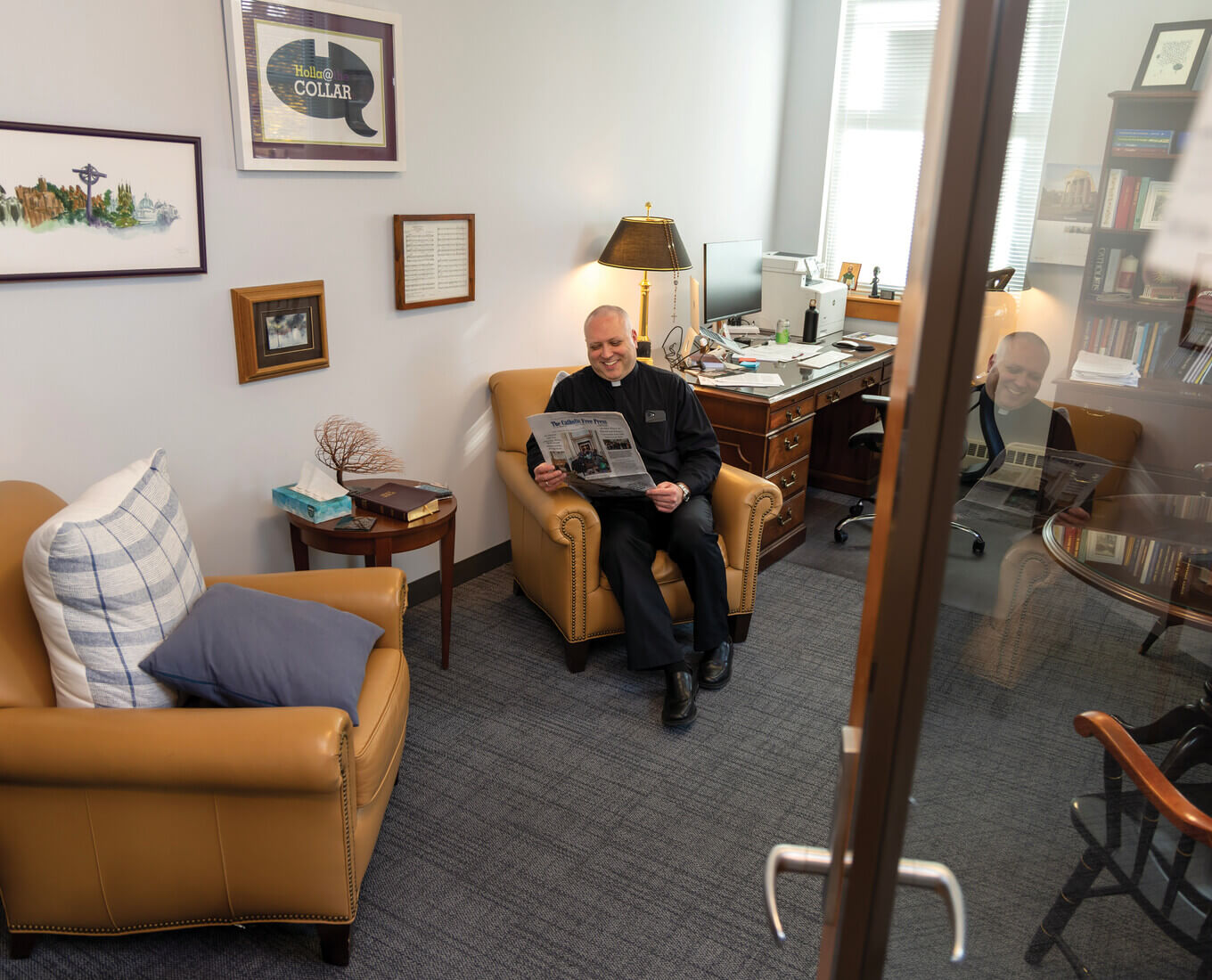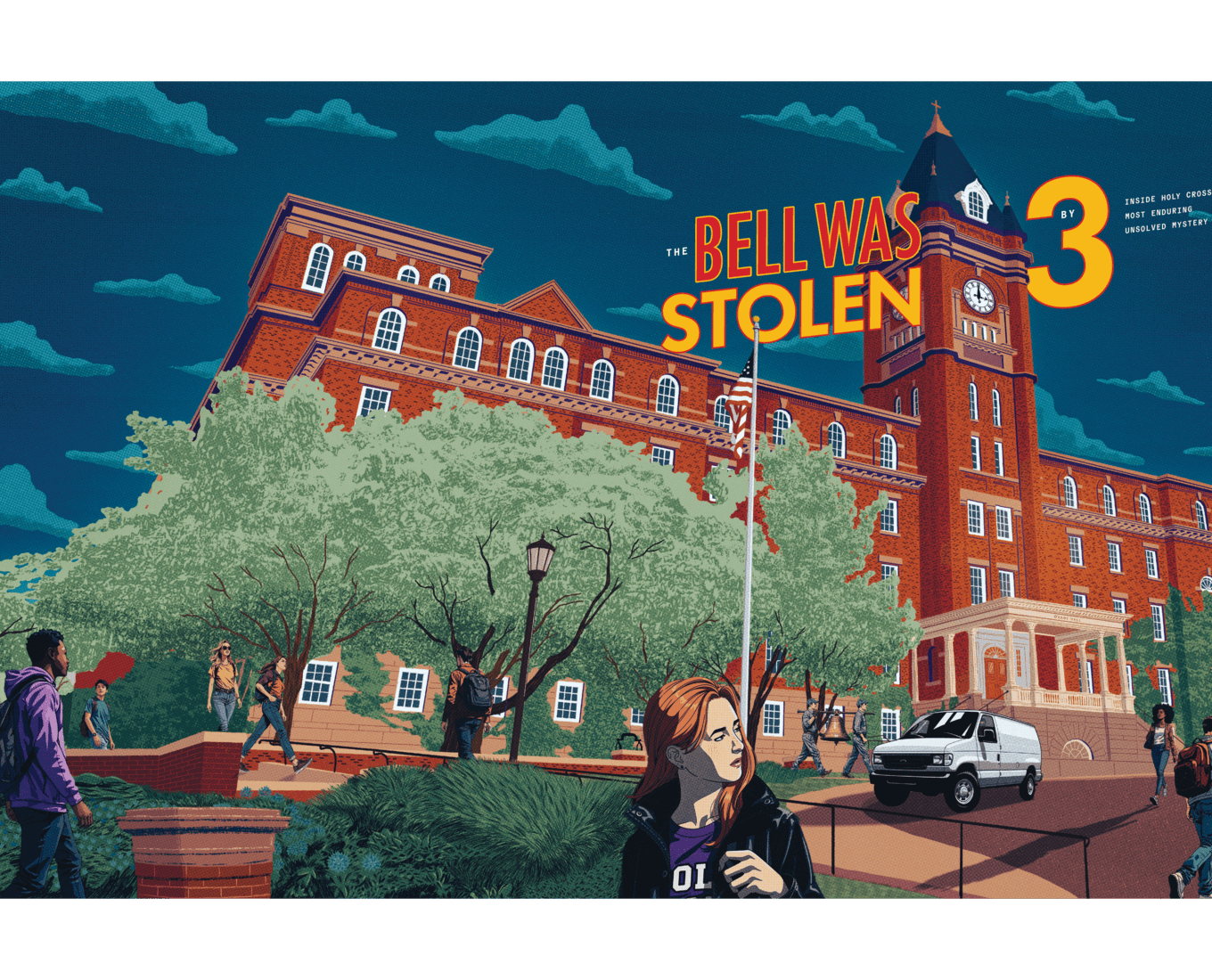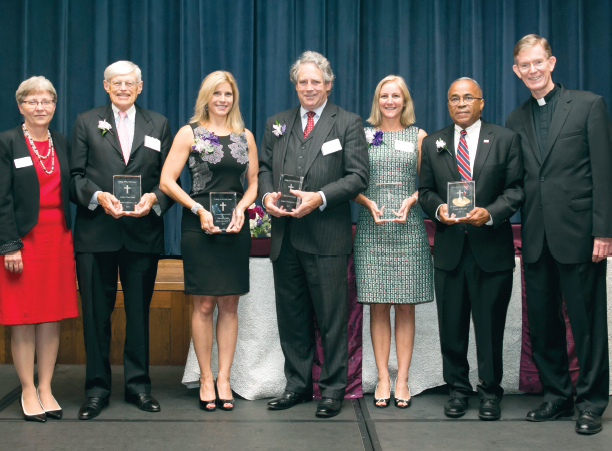 “You offer a strong voice to the powerless, relief to the oppressed and justice to the wronged.”
“You offer a strong voice to the powerless, relief to the oppressed and justice to the wronged.”
“You have worked tirelessly to remove barriers to access and provide first-quality dental services for Rhode Island’s infants, children and the underserved.”
“Your stellar personal qualities, Jesuit education and military experiences have served as the rock-solid foundation for your long and distinguished career in service to others.”
“You are a man for others in the best Jesuit tradition.”
“You served your community with distinction as the vision-forward leader of a grand-scale medical campus project that has transformed health care delivery throughout Western New York.”
These represent just a few selections from the impressive citations that accompanied the presentation of the 20th annual Sanctae Crucis awards on Sept. 22 in the Hogan Ballroom. The recipients — Thomas R. Beecher Jr. ’56; Deborah L. Fuller, D.M.D., M.S., M.P.H., ’91; Katherine M. Gallagher ’92; Stephen P. Harbeck ’68; and Col. Malcolm N. Joseph III, M.D., USAF (Ret.), ’71 — are leaders in business, professional or civic life; live by the highest intellectual and ethical standards; and are committed to the service of faith and promotion of justice. But, more important, they are all alumni who continue to live out the Holy Cross mission long after their walk across the commencement stage.
Read on to learn about the unique role Holy Cross played in shaping each of these distinguished alumni.
Malcolm N. Joseph III ’71
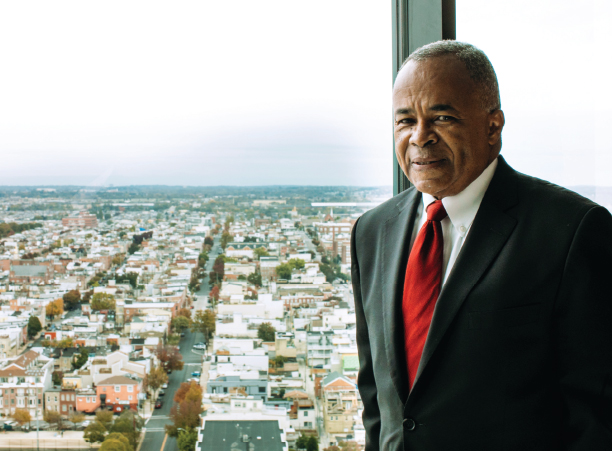 Photo by Kate Headley
Photo by Kate HeadleyAdmission to Holy Cross was the answer to a prayer Malcolm Joseph III offered on a retreat he attended as a high school senior. The letter he prayed for was waiting for him when he arrived home. Joseph chose Holy Cross because it had the best premed program among the top-tier colleges that were interested in the student from Cardinal Hayes High, an integrated school in the Bronx. He eventually became the College’s first black alumnus to graduate from medical school; President John E. Brooks, S.J., ’49 proudly attended his graduation from Boston University School of Medicine.
The young man from the Bronx was among an extraordinary coterie of 20 black students who came to Holy Cross in the 1960s, most of whom were recruited personally by Fr. Brooks to diversify the student body. “I met Fr. Brooks sophomore year,” says Joseph, who juggled Air Force ROTC duties with academic demands, resident advisor responsibilities and financial aid worries. “The strong support I received from him was central to everything that I have accomplished. He helped me stay at Holy Cross.”
“I was the first person in my family to go to college,” says Joseph, a member of the Holy Cross President’s Council and the O’Callahan Society. “I felt blessed. Freshman year was tough, but 1968 was a year of great change in America. There was Vietnam, the draft and the Civil Rights Movement. The Reverend Martin Luther King, Jr. and Senator Robert Kennedy were assassinated.” That same year, Arthur Martin ’70 became the founding president of the Black Student Union on campus.
Joseph did not anticipate the racism he would encounter when he arrived on campus in 1967. He felt isolated and unsafe outside the classroom. A Jesuit who had learned about several incidents expressed concern for the first-year student’s personal safety, and he offered assistance if Joseph wanted to transfer to Fordham. “At the time, I thought, ‘Then do something about it,’ but he didn’t say anything else,” Joseph recalls. “I was angry, but I said, ‘I’m not leaving.’”
Joseph made lifelong friends at Holy Cross, beginning with his roommate of two years, Francis (Frank) Xavier Gleason, M.D. ’71. “Frank was the ideal roommate and a man of great character. His parents treated me like a son. I met some wonderful people, like Arthur, Ted Wells ’72, Tim Porter ’68 and Clarence Thomas ’71, among others. We’re like family after 50 years of life together.”
Resilient and focused, Joseph found strength in the lessons and example of his father, a sailor in the U.S. Navy in the Pacific Theater during World War II, who continued to serve after the war with the New York State Army National Guard, retiring with the rank of Command Sergeant Major. His father worked two full-time jobs to help Joseph and his younger twin siblings go to college. “My father taught me at a young age that if you run, you’ll always run,” Joseph explains. “He said, ‘You may lose, but you must stay and fight.’ I learned from both of my parents to treat everyone with dignity and respect.” Their words and love, plus Fr. Brooks’ unfailing support, carried him through the challenges he faced as one of the pioneering black students at Holy Cross and later as an Air Force officer stationed in Georgia.
After completing aerospace medical training, Joseph was assigned to Andrews Air Force base as a flight surgeon. He traveled the world on Air Force Two to provide medical staffing in support of White House and Congressional Special Air Missions through three administrations, and he was former vice president Walter Mondale’s personal physician for international travel. Joseph retired from the Air Force with an aeronautical rating of chief flight surgeon and the rank of colonel, after more than two decades of active military service.
In 1998, he joined CareFirst BlueCross BlueShield in Baltimore as medical director. In that leadership role, he has been a tireless advocate for increased access to health care for the greater Baltimore community, while assisting with public and private health care issues for the uninsured, the homeless and the marginalized. He is also a powerful voice in the dialogue on diversity, wellness and disease prevention through his engagement at the state and national levels of health care advocacy, board memberships and fundraising initiatives focused on sickle cell disease.
As a young Air Force captain, Joseph met his future wife, Pamela, an Air Force major and flight nurse, and started his own family: a son, Malcolm IV, and three daughters, Elizabeth, Natalie and Margaret. Though Pam passed away in 2015 after 32 years of marriage, Joseph credits his late wife with bringing him back to the church. When they lost their daughter, Elizabeth, at age 3, Fr. Brooks said her funeral Mass. Joseph was honored to be a pallbearer at the funeral of Fr. Brooks, his friend and mentor, in 2012.
“Fr. Brooks did everything he could to prepare us for life after graduation,” Joseph says. “He said it was my responsibility to educate others when I encountered ignorance. I also will always remember the advice of Fr. Ambrose Mahoney [S.J., dean of admissions]: ‘Work Hard. Play Hard. Pray hard in that order.’” This son of Holy Cross believes that today’s students should take these lessons to heart as he did more than half a century ago.
Katherine M. Gallagher ’92
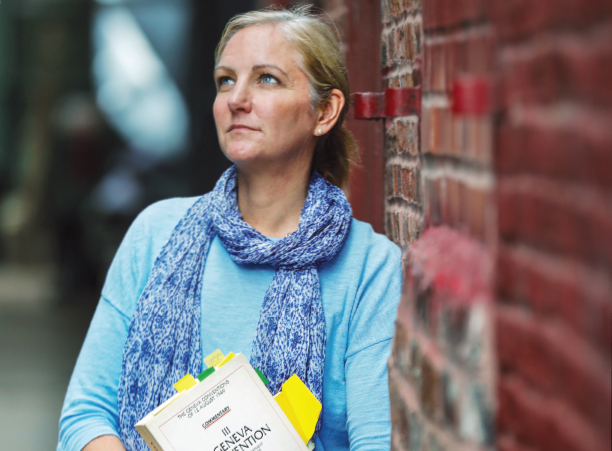 Photo by Michael Paras
Photo by Michael ParasKatie Gallagher discerns no clear divide between her work — international criminal law, universal justice and human rights advocacy — and her larger life. A senior staff attorney with the Center for Constitutional Rights in New York, Gallagher has worked tirelessly for more than two decades to hold accountable those who perpetrate serious human rights violations within the global community. She feels fortunate to have a “day job” that she connects with at a very deep level, focused on fighting injustice using the law as a tool — in conjunction with advocacy — to contribute to structural and social change.
As a political science major with a burgeoning interest in the Middle East, she initially had no interest in going to law school. “Political science Professor Maurizio Vannicelli mentored and inspired me at Holy Cross,” she said. “He also helped to make sure that my junior year abroad in Egypt happened. I left for Egypt two weeks after Iraq invaded Kuwait. The start of the Gulf War in January 1991 meant I had to fly back home early. Sadly, Professor Vannicelli died that spring.”
After graduation, Gallagher spent a year in Israel/Palestine and worked at a joint Palestinian-Israeli-run news organization in Jerusalem. She then earned a master’s degree in journalism and Middle East studies from New York University. After spending a year in Syria to develop her Arabic, she thought she was headed to an academic career, but discussions with a Ph.D. program adviser about her intended focus led to the realization that a law degree would enable her to work more effectively against injustice and human rights abuses. At CUNY School of Law, she served as editor-in-chief of the New York City Law Review, interned with the Women’s Caucus for Gender Justice in the International Criminal Court and graduated in 2000 with a J.D. The following year, she joined the Organization for Security and Cooperation in Europe as a legal adviser in Kosovo and next, United Nations International Criminal Tribunal for the former Yugoslavia as a legal officer and then prosecutor. During these years, Gallagher was also able to serve short stints at the International Criminal Tribunal for Rwanda, the Special Court for Sierra Leone in Freetown and with the United Nations in Beirut.
In 2006, Gallagher joined the Center for Constitutional Rights, or CCR. She speaks and writes extensively about the cases she has worked, the causes about which she cares and the issues that she believes deserve the world’s attention, including the torture at Abu Ghraib and the Survivors Network of those Abused by Priests (SNAP) versus the Vatican. She increases the visibility of CCR’s vital work through social media, research, writing, public lectures, teaching and television appearances. Her commentaries have appeared in The New York Times, The Guardian and the Jurist, among other publications.
Gallagher grew up as one of six siblings in a large, socially conscious family with deep Holy Cross roots; her father, Eugene ’61, and sisters Cynthia ’90 and Jessica ’99 join her as alumni, but all of her siblings were Jesuit educated in either high school or college. “Our parents encouraged each of us to follow our own paths, to pursue what interested us and to go where our curiosity took us. They weren’t always happy with our choices, but they didn’t hold us back. I went to Catholic grammar school and high school, where service was built in. But I wasn’t aware of how privileged I was. I began to get a sense of the larger world, beginning when I learned about apartheid in South Africa during my high school years.”
When Gallagher’s Holy Cross housemates nominated her for the Sanctae Crucis Award, they wrote, “Katie exemplifies the goal of Jesuit education as a woman for others. She has spent her entire career fighting for the rights of the oppressed and disadvantaged…helping those who don’t have a voice. Katie’s work makes a difference in the achievement of human rights for all.”
“Friends have kept me connected to Holy Cross,” Gallagher said. “I’m so grateful that they kept me in the loop through all the years I was living and working abroad. I became more politically aware during my years at Holy Cross. I appreciate the analytical skills and values I learned or strengthened. Learning to stand in solidarity with others is one of those values. The College also played a key role in connecting me with the larger world.”
It took that time abroad for Gallagher to realize how interrelated domestic and international injustices are, just as many of the current struggles for justice, dignity and equality at home and abroad are interconnected, and are best addressed through cross-movement, global solidarity. “So much of my career looks to be about international work, but it’s also about being an American and what that means. The U.S. plays a unique economic and military role globally — and thus being an American carries responsibilities with it.”
Gallagher offers this advice to today’s students searching for a clear path to life after graduation: “I advise law students to find something that connects with who they are. They need to get meaning and enjoyment from what they do if they want to have a sustainable career and a sustainable life.”
Stephen P. Harbeck ’68
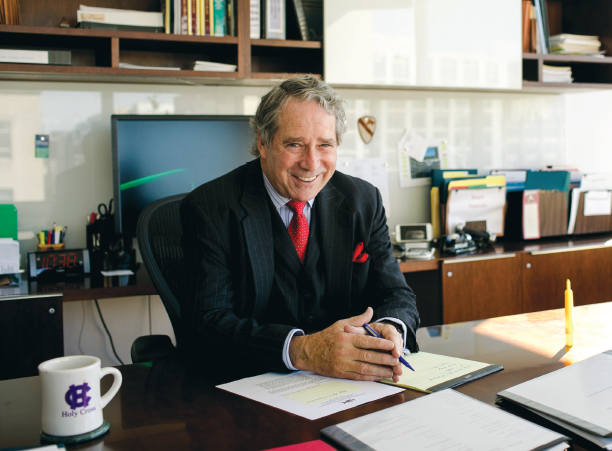 Photo by Kate Headley
Photo by Kate HeadleyNever try to outrun or outgun Stephen Harbeck. Troubled brokerage firms of all sizes, even those touted as “too big to fail,” have learned that hard lesson during Harbeck’s more than four decades with the Securities Investor Protection Corporation (SIPC), where he was named CEO and president in 2003. With a quick intellect, mastery of the law and SIPC statute, plus a crack team of experts, this strong and principled leader wades fearlessly into fiscal quagmires that have left financial institutions bankrupt and their unsuspecting investors reeling.
Harbeck has been moving in the fast lane since he chose Holy Cross over Fordham. He and his classmates Paul Hartrey and John Collins, plus Chris Shea ’66, have held the record of 42.7 seconds in the 4x110 yard relay on the Hill for more than a half-century. “For me, the bridge between high school and Holy Cross was that I was a runner,” Harbeck explains. “I met with Fr. Ambrose Mahoney, the dean of admissions. I told him I wasn’t sure I’d have time for track. He responded in Jesuit fashion by saying, ‘Let’s examine this. You got here by getting up every morning to train. Why change that?’ It was basically a one-sentence conversation that resonated with me and helped me make the transition between high school and college.”
Unfortunately, the record-setting April Fool’s Day relay in 1966 was the last race Harbeck ever ran. “After that race, I blew my hamstring,” he explains. “But the self-discipline I developed and the intellectually rigorous liberal arts education I got at Holy Cross helped me to make the sound analysis I needed to succeed in law school. The faculty made you think. All of that helped me in combat as well.”
Drafted four days after finals during his first year at Cornell University Law School, Harbeck served his country with distinction during his two-year commitment, which included a 10-month deployment in Vietnam, where he served as a sniper with a reconnaissance platoon. After fulfilling his military service he returned to Cornell Law, where he met his future wife. “Judy and I met in her second-year class,” Harbeck said. “Thanks to the U.S. Army, I ended up in her class. It was a happy accident. We’ve been married for 45 years.” They have a son and daughter, plus two granddaughters who call Harbeck “Dude.”
In 1975, the Harbecks moved to Washington, D.C., where he joined the SIPC legal staff. He soon began moving up the ranks. He was elevated to general counsel in 1995 and later served as president and chief executive officer. Until 2008, the biggest bankruptcy case SIPC had handled since Congress established the agency in 1970 amounted to $175 million. That figure rose astronomically to nearly $100 billion during the height of the nation’s financial crisis. When the three towering securities firms, Lehman Brothers, Madoff Investment Securities and MF Global, fell like dominoes within three years, those failures presented a challenge of historic proportions for SIPC to untangle with potential investor losses in the upper billions.
His compassionate leadership and adherence to the law were challenged as well. “It was very hard to tell Madoff investors that their profits didn’t exist,” says Harbeck, whose commitment to the equitable treatment of investors was recognized with a 2015 Turnaround Atlas Award for leadership achievement. “We had to deal with people whose anger with Madoff was misdirected at us. Madoff’s clients thought they had $67 billion. Through aggressive litigation, we made sure that anyone who put in $1.25 million got their money back. We recovered $12 billion out of $17 billion. We try to do the best we can for the greatest number of people, consistent with the law.”
Harbeck also contributes to the education of the next generation of lawyers through his teaching as an adjunct professor of bankruptcy law at American University’s Washington College of Law, by writing extensively on bankruptcy and through his commitment to expanding investor educational initiatives. He is admitted to practice law before the U.S. Supreme Court and numerous U.S. Courts of Appeals. Harbeck is known to be calm under fire, whether he’s speaking with opposing legal teams or testifying on Capitol Hill. Everything about his Jesuit education, decorated military service and law degree prepared him for the key role he plays in righting the wrongs of financial failure and fraud, and protecting the victims.
“Being in the military opens you up to a broader spectrum of people,” he said. “You have to deal with everyone. If you think you know the way to go, you have to be able to communicate your plan and convince others. I advise students to take courses outside of their comfort zones. Read as much as they can. Read an actual book for joy and to get away from computer screens. Liberal arts educations are looked at as an anachronism and unnecessary by some today, and I protest. Holy Cross will still be here and be needed in another 50 years.”
Thomas R. Beecher Jr. ’56
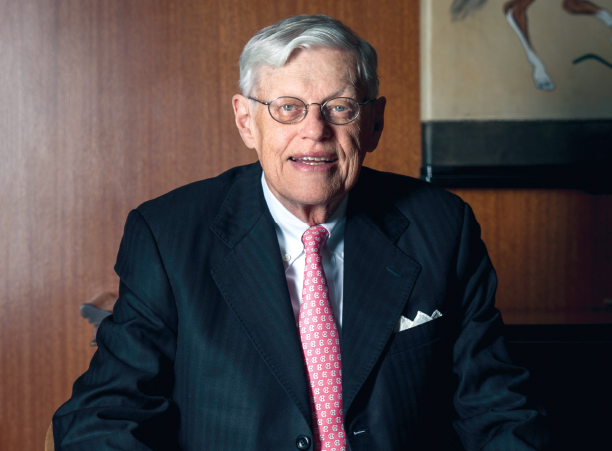 Photo by Vincent Lopez
Photo by Vincent LopezTo hear Tom Beecher tell it, the narrative of his life is characters, action and no plot. He underscores “serendipity” as a significant factor in his distinguished law career and outsized life of service to others. “Ignatian faith in action” is how those who know him best would describe the decades and depth of his personal commitment to elevating the quality of life, increasing access to health care and providing hot meals and educational opportunities for disadvantaged children and their families in his native Buffalo.
Beecher’s adult life took form at 13, when his mother died of cancer. The oldest of six children, the grieving teen learned to cook at the side of his father and a stern but loving aunt who moved in for two years to help stabilize the family. When his father remarried and had three more children, Beecher drew deeper from the family well of love and care for others that he described as “the earmark of my early years.”
“The death of my mother when I was in eighth grade was very difficult,” he explains. “I was just starting in a Jesuit high school. Two Jesuits there seemed to know what I was going through and kept an eye on me. I was carried through by their support, the loving example of my Aunt Elizabeth, who left a great job to come live with us, and the devotion to family that I had learned from my parents. There was a spirit of doing for others in our house.”
A humble man of strong faith, Beecher has long trusted God to determine his next move. “I have a motto: ‘I’m here, Lord. Do what you will with me,’” he says. “I’ve never made long-range plans. I had no idea what I would do after I graduated from Holy Cross. Joining my father’s textile business was not an attractive option for me. Instead, I’ve been trying things for a year all my life.”
He tried law school for a year, liked it and did well, so he went on to earn a J.D. in 1959 from the State University of New York at Buffalo Law School. He then decided to practice law for a year. More than half a century later, he is counsel with the Buffalo law firm Phillips Lytle, where he is a former partner. In 2014, he received the New York State Bar Association’s Root/Stimson Award, honoring his exemplary community service. He is also the founding CEO of Barrantys LLC, a wealth management firm.
With vision and verve, he also led the grand-scale Buffalo Niagara Medical Campus planning effort, clearing years of financial and logistical obstacles, while building strong networks of business and community support for the project. The Thomas R. Beecher, Jr., Innovation Center on the new medical campus honors his heroic leadership. In 1995, Beecher and two Boston College alumni founded the Buffalo Inner-City Scholarship Opportunity Network, or BISON, which has funded 23,000 scholarships for low-income students seeking private elementary education. He jokes that it took “two BC guys and only one Holy Cross alum to get the job done.”
At the heart of Beecher’s countless good works and active leadership on many boards are the children and families who depend on others for help and hot meals. Years ago, he stopped by a soup kitchen in Buffalo to donate $100. When she heard that he had been cooking since childhood and had honed his culinary skills in the Army Reserves, the director offered him an apron and an opportunity to cook 150 to 300 hot meals for the homeless on Saturday nights. He volunteered there for nearly a decade. “That was my first opportunity to be eyeball-to-eyeball with people in need. These days I serve hot breakfasts to kids twice a week during the school year.”
Beecher’s four years on The Hill helped to reinforce and broaden his ideas about who “the others” might be and how he could help. “My wife, Judy, has inspired me as well. She has always been supportive, especially when I traveled so much. She even went back to college while raising our son, Tom, and daughter, Kathleen ’90.” Judy passed away shortly after Beecher received his award, on Oct. 28, 2017.
Beecher, who has made time to speak to prebusiness classes on the Hill, offered this advice to today’s Holy Cross students: “Listen to the Lord. Be open for opportunities not just to make more money, but to be a man or a woman for others.” Wise words to heed from an alumnus who has always listened to them carefully.
Deborah L. Fuller ’91
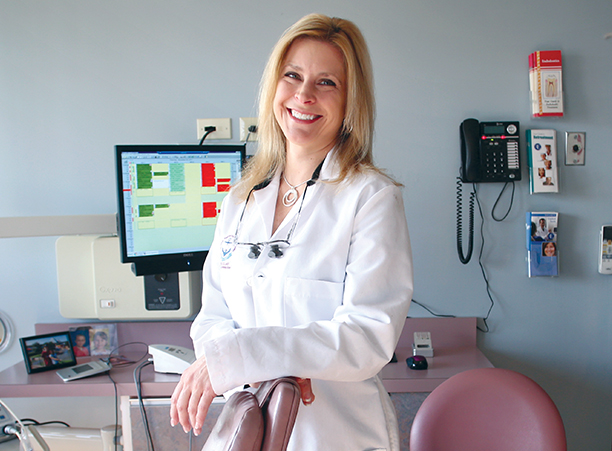 Photo by Tom Rettig
Photo by Tom RettigDeborah Fuller was the first in her family to go to college — and she had a plan. A premed major, she intended to go on to medical school and become a physician. She made a midcourse adjustment sophomore year by deciding to go to dental school after graduation; she thought a career in dentistry would allow more predictable and manageable hours, and it would blend science and art. Her then-boyfriend, now husband, Brian Gaudette ’89, was two years ahead of her in dental school.
Fuller graduated from the University of Connecticut School of Dental Medicine in 1995 and completed a residency there the following year. When her plan to be a traditional dentist became a reality, she realized that a clinical path in dentistry was not what she wanted. She dreaded telling her parents.
“This was a big switch for me — and for my family,” she says. “As an only child and only grandchild, I felt great pressure to succeed. My parents had had no experience looking at colleges. I tagged along with a best friend’s family. Holy Cross was the third school we visited. I had an ‘Aha’ moment the minute I walked onto campus. After all these years in school at Holy Cross and UConn, I now had to tell my parents at 25 that my career path wasn’t going to be that of a traditional family dentist hanging out a shingle on Main Street. It just wasn’t for me. My parents and husband were very supportive of my decision, as they wanted to see me happy and successful in my career.”
Fuller broadened her reach in dentistry through networking and talking with dental faculty. She received a job offer from a dental implant company, took a deep breath and jumped in with both feet. “I was a science person with no business or corporate experience, but I wasn’t afraid to try something new because I felt supported in my decision,” she explains. “I wanted to understand the business end of things, so I earned a master’s degree in management with a concentration in health care in 1999.”
Fuller’s nontraditional career in dentistry is both broad and deep. She has provided oral health care in private practice and community settings, and has worked in the dental product and dental insurance industries and public health, and conducted research. Additionally, Fuller enjoys working with predental students and dental students through her involvement on the Board of Directors for the UConn Dental School Alumni Association. Her students seem more aware of career options beyond the traditional clinical path in dentistry, she noted. “I always encourage today’s students to think outside the box and to look at community service and other opportunities — to explore what else they can do with their talents and knowledge and skills in dentistry.”
Her volunteerism is also generous and wide-ranging, and she has focused her efforts within the confines of Rhode Island.
“We moved to Rhode Island for Brian’s job in endodontics,” Fuller explains. “I got involved in public health, which opened up this whole world of underserved children and clients with serious oral health care needs. Rhode Island is so small that people in the dental field all know each other and are of the same mindset.”
She established a strong network of dental professionals committed to designing new strategies, programs and educational efforts to improve oral health care for the state’s children and families. Currently, she serves as director of network development for MetLife, where she manages the team responsible for expanding and maintaining the preferred dentists program and dental managed care nationwide. Since 2003, she has served as the public health dentist within the Rhode Island Department of Health, as a consultant for the state’s Medicaid program, and for the Ryan White Program of HIV/AIDS on policy and best practices in her long litany of engagement and leadership in oral health care issues and access.
A founding member of the Rhode Island Oral Health Foundation, Fuller has demonstrated a personal and professional commitment to serving the state’s children and families, highly evident in the foundation’s signature high-impact annual event, the Rhode Island Mission of Mercy. The free pop-up two-day clinic provides free dental care to the uninsured, underinsured or anyone who lacks access to dental care. Since 2012, Mission of Mercy volunteer dental professionals have cared for more than 4,000 patients and performed nearly 16,000 oral procedures worth $2.3 million.
“Nobody said no to the idea of establishing a Mission of Mercy here in 2011,” Fuller says. “Now our son and daughter volunteer at the clinic itself, where Brian leads the endodontic department.”
Fuller’s first example of a woman for others was her mother, who tried to do all she could for her family, her church and her community. Those lessons were reinforced at Holy Cross. “My mother never said no to helping others. The Holy Cross culture was overarching toward service for others. The Jesuits’ vision and mission really connected the idea of living a purposeful life and helping others in need.”
Written by Elizabeth Walker for the Winter 2018 issue of Holy Cross Magazine
About Holy Cross Magazine
Holy Cross Magazine (HCM) is the quarterly alumni publication of the College of the Holy Cross. The award-winning publication is mailed to alumni and friends of the College and includes intriguing profiles, make-you-think features, alumni news, exclusive photos and more. Visit magazine.holycross.edu/about to contact HCM, submit alumni class notes, milestones, or letters to the editor.
